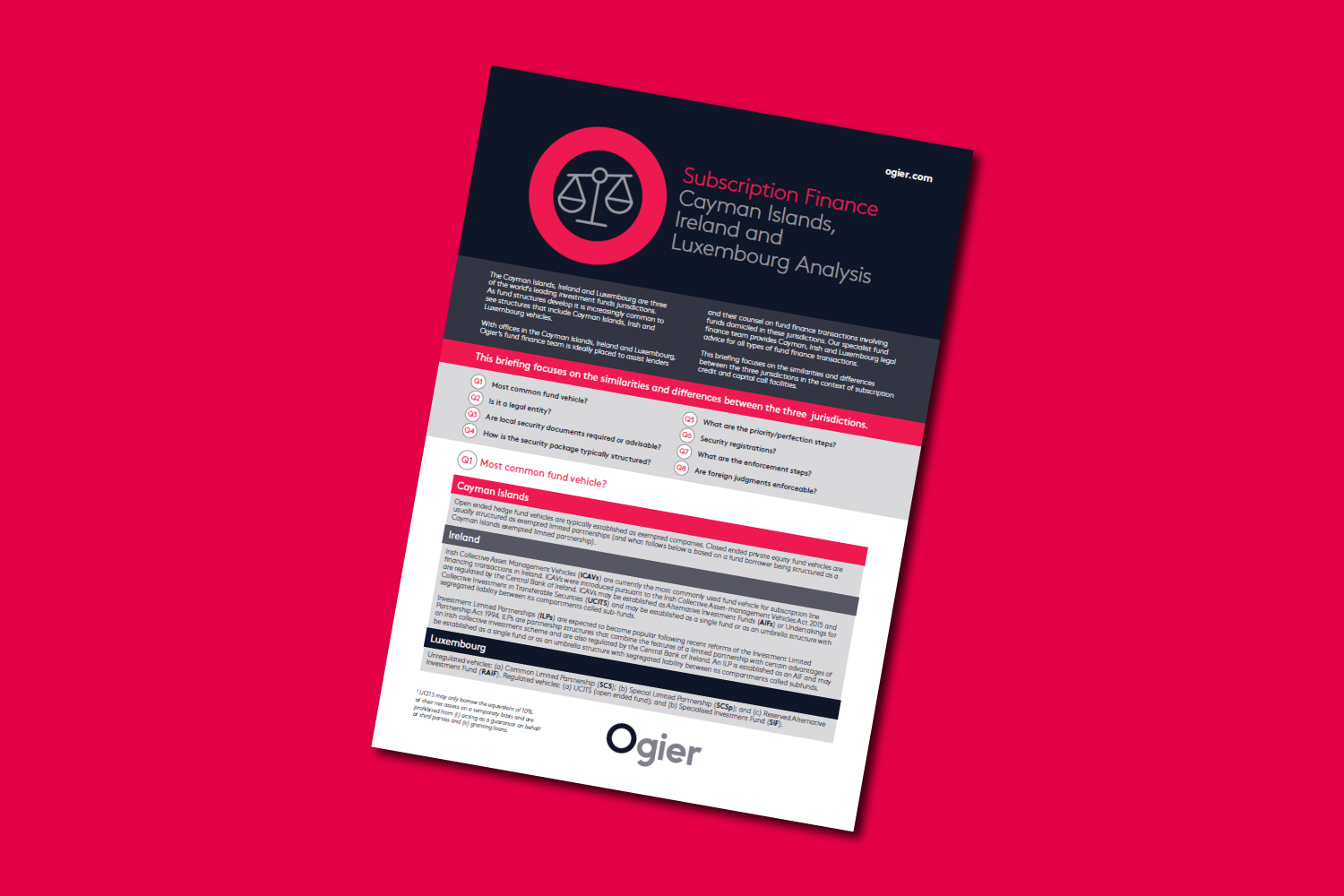
James Heinicke
Partner | Legal
Cayman Islands

James Heinicke
Partner
Cayman Islands

The Cayman Islands, Luxembourg and Ireland are three of the world’s leading investment funds jurisdictions. As fund structures develop it is increasingly common to see structures that include Cayman Islands, Luxembourg and Irish vehicles.
With offices in the Cayman Islands, Luxembourg and Ireland, Ogier’s Fund Finance team is ideally placed to assist lenders and their counsel on fund finance transactions involving funds domiciled in these jurisdictions. Our specialist team provides Cayman, Luxembourg and Irish legal advice for all types of fund finance transactions.
This briefing focuses on the similarities and differences between the three jurisdictions in the context of subscription credit and capital call facilities.
Open ended hedge fund vehicles are typically established as exempted companies. Closed ended private equity fund vehicles are usually structured as exempted limited partnerships (and what follows below is based on a fund borrower being structured as a Cayman Islands exempted limited partnership).
The most commonly used regulated vehicles are: (a) Common Limited Partnership (SCS); (b) Special Limited Partnership (SCSp); and (c) Reserved Alternative Investment Fund (RAIF).
For regulated vehicles, they are: (a) Undertakings for Collective Investment in Transferable Securities (UCITS) (open ended fund); and (b) Specialised Investment Fund (SIF).
Irish Collective Asset Management Vehicles (ICAVs) are currently the most commonly used fund vehicle for subscription line financing transactions in Ireland. ICAVs were introduced pursuant to the Irish Collective Asset-management Vehicles Act 2015 and are regulated by the Central Bank of Ireland. ICAVs may be established as Alternative Investment Funds (AIFs) or UCITS and may be established as a single fund or as an umbrella structure with segregated liability between its compartments called sub-funds.
Investment Limited Partnerships (ILPs) are expected to become popular following recent reforms of the Investment Limited Partnership Act 1994. ILPs are partnership structures that combine the features of a limited partnership with certain advantages of an Irish collective investment scheme and are also regulated by the Central Bank of Ireland. An ILP is established as an AIF and may be established as a single fund or as an umbrella structure with segregated liability between its compartments called subfunds.
A Cayman Islands exempted limited partnership is not a legal entity – it acts through its general partner (GP). The GP would typically be a Cayman Islands exempted company or limited liability company (LLC), a Cayman Islands exempted limited partnership (which itself would have its own GP) or a foreign entity (such as a Delaware LLC).
Yes, other than the SCSp, which has no separate legal personality. Both the SCS and the SCSp act through their GP. The GP would typically be a Luxembourg private limited liability company or a Luxembourg SCSp (which itself would have its own GP).
An ICAV is a separate legal entity. An ILP is not a separate legal entity and acts through its general partner.
It is not necessary to have a local security agreement to document the security over the uncalled capital commitments and the rights to call capital. Nor is it necessary to have a local security agreement to document security over the bank account into which capital commitments are deposited – the collateral account would not usually be located in the Cayman Islands so the bank account security would be governed by the laws governing the account (typically US or English law).
It is recommended and it is market practice to have local security agreements over the assets located or deemed to be located in Luxembourg (such as claims governed by Luxembourg law or owed by a debtor located in Luxembourg, or accounts opened with banks located in Luxembourg). In each case, Luxembourg law will apply in relation to the creation, perfection and enforcement of security interests over assets located in Luxembourg.
The lex situs (law of the location where the assets are situated) of the assets to be secured should be taken into account. It is recommended and is market practice to require Irish security over the relevant assets located in Ireland (for example, where the rights to call capital are contained in a subscription agreement/commitment agreement/investment limited partnership agreement governed by Irish law or the bank accounts into which capital commitments are deposited are located in Ireland). We would also expect that any control agreements in respect of bank accounts located in Ireland would be governed by Irish law.
Security over uncalled capital commitments and rights to call capital are typically expressed as an assignment by way of security and it is usual for both the fund (acting through its GP) and the GP to be party to the security agreement. The Exempted Limited Partnership Act (Revised) provides that the right to make capital calls and receive the proceeds of them are assets of the exempted limited partnership and are held on trust for the exempted limited partnership by the GP. Where rights to call capital have been formally delegated to the fund’s investment manager (either within the terms of the fund’s exempted limited partnership agreement or pursuant to an investment management agreement) consideration should be given as to whether the investment manager ought to also grant security over any rights it may have to call capital on behalf of the fund. Security over a Cayman Islands bank account would typically be expressed as a bank account charge and would be entered into by the fund acting through its GP.
Security over uncalled capital commitments and rights to call capital are typically expressed as a pledge agreement or security assignment. It is usual for both the fund and the GP to be party to such security agreements. When the fund qualifies as an alternative investment fund, it is required to appoint an authorized alternative investment fund manager (AIFM) and a depositary located in Luxembourg. Depending on the terms of the fund documents, the AIFM may also have to become a party to the security documents. Security over an account into which the investors deposit their capital commitments would typically be expressed as a bank account pledge. Sometimes depositary agreements grant a right of information/right of consent to the depositary in connection with the creation of security over the deposit accounts held at the depositary. The creation of such security is governed by the law of 5 August 2005 on financial collateral arrangements, as amended.
A typical security package includes security over the fund’s rights to make capital calls against investors (contained for example in a subscription/commitment agreement/investment limited partnership agreement) by way of security assignment, and security over the relevant bank account into which the subscription monies are to be deposited by way of an account charge. A security power of attorney typically also forms part of the security package. An account control agreement may also be required.
Depending on the terms of the fund documents in respect of the rights to call capital and the extent of the role performed by/delegated to any fund service provider, consideration may need to be given to the need for any fund service provider to be a party to the security documents. In practice, typically side letters are issued instead by any relevant fund service provider in favour of the lender/secured party over any rights it has to issue capital call notices if necessary.
Priority of the security over the uncalled capital commitments is achieved by giving notice of the creation of the security interest to the investors. Generally, where there are competing security interests over uncalled capital commitments, the first security interest that has been notified to the investors will take priority regardless of when the security interests were created. Notice of the security can only be given once the security has been created. Ideally, notice should be given immediately upon execution of the security agreement, or within a few days, to ensure the secured party’s priority is fixed. The security agreement should also contain a requirement that notice be given to any new investor that is admitted to the fund after closing of the facility.
It is established market practice for lenders to require evidence to confirm that the investor notices have been sent to investors. The available evidence will depend upon how the notices have been delivered - if the notices have been sent by email, a copy of the email from the fund to its investors would likely suffice. If the notice has been uploaded onto the fund's online portal the available evidence may depend in part on what the portal can generate to evidence delivery, although we would expect the lender to receive a copy of the message that is sent to the investors, together with a screenshot of the notice uploaded to the portal.
Priority of the security over the bank account into which capital commitments are deposited (if the account is located in the Cayman Islands) is achieved by giving notice of the creation of the security interest to the account bank.
No notification is required in order to validly create and perfect the security over the uncalled capital commitments. Such security is perfected by the mere conclusion of the security assignment/pledge agreement between the fund, the general partner and the lender.
However, an investor may nevertheless validly discharge its obligation under the subscription agreement as long as it has no notice of the assignment/pledge. Notification of the security is therefore recommended even if not required for perfection purposes. In relation to the perfection of the bank account security, the account bank must be notified of the pledge and asked to relinquish any rights of set off, combination of accounts or first ranking pledge in respect of the account collateral which would otherwise apply in standard account bank terms and conditions, by way of an acknowledgement.
Perfection and priority of a security interest under Irish law is a practical matter involving the registration of the security and the delivery of notices of assignment. Post-closing security registrations are further discussed below.
Under Irish law, notices of assignment must be served in order achieve a legal assignment of security (rather than an equitable assignment only). There is no prescribed timeframe within which the notices must be served however they are typically and most commonly delivered as soon as possible following creation of the security to perfect and to ensure priority. In relation to the perfection of the bank account security, the account bank must be notified of the account charge and asked to relinquish any rights of set off, recoupment or debit in respect of the account collateral which would otherwise apply in standard account bank terms and conditions.
There is no central security registration regime in the Cayman Islands for security over uncalled capital commitments and rights to call capital. Cayman companies (including LLCs) are required to maintain a register of mortgages and charges into which details of all security interests granted by a Cayman company need to be entered. The register of mortgages and charges is an internal register only and failure to make an entry does not affect priority or validity of the security.
Where a Cayman company is the GP of a fund that has granted security, it is common for the GP to make an entry in its register of mortgages and charges in respect of security interests granted by it in its capacity as general partner, but failure to make such an entry does not of itself operate to invalidate or affect the priority of the security interests.
There is no central security registration regime in Luxembourg.
ICAV: a form CH1.1 must be lodged with the Central Bank of Ireland against the ICAV within 21 days from the date of creation of the relevant security. In practice, these are filed as soon as possible following closing to ensure priority.
ILP: if the general partner of an ILP is an Irish company, a form C1 must be lodged with the Irish Companies Registration Office against the general partner within 21 days from the date of creation of the relevant security. In practice, these are filed as soon as possible following closing to ensure priority. A section 1001 notice in relation to book debts must also be lodged with the Irish Revenue Commissioners within 21 days from the date of creation of the relevant security.
A secured party would enforce using its contractual rights under the relevant security documentation. Where the security documentation is Cayman Islands law governed, an enforcement scenario would likely involve the secured party appointing a third-party receiver over the collateral. The receiver would take action to recover the outstanding secured obligations for the secured party which would result in the receiver making capital calls on the investors.
With respect to Luxembourg law governed security agreements, the secured party will likely step into the shoes of the GP (or the AIFM/investment manager as applicable) and make capital calls either in the secured party’s name or the name of the GP (or the AIFM/investment manager as applicable) pursuant to the terms of the security documentation and in accordance with the fund's constitutional documents. The secured party would typically have the power to direct where the investors pay their capital calls at that point but may rely on a co-related account pledge to trap the capital call proceeds instead.
A secured party would enforce using its contractual rights under the relevant security documentation. An enforcement scenario would likely involve the secured party appointing a third party receiver pursuant to the terms of the relevant security document over the collateral. The receiver would take action to recover the outstanding secured obligations for the secured party which would result in the receiver making capital calls on the investors.
Although there is no statutory enforcement in the Cayman Islands of judgments or orders obtained in foreign courts (other than certain courts of Australia and its external territories), the courts of the Cayman Islands will generally recognise and enforce a foreign judgment or order, without re-examination or re-litigation of the matters adjudicated upon provided the judgment or order: (a) is given by a foreign court of competent jurisdiction; (b) is final and conclusive; (c) is not in respect of a tax, fine or other penalty; (d) was not obtained by fraud; and (e) is not of a kind, the enforcement of which is contrary to public policy in the Cayman Islands.
A judgment obtained from any court of competent jurisdiction in the State of New York or England which is enforceable in the United States of America or England (as applicable) may be recognised and enforced before the Luxembourg courts, without re-examination of the merits or re-litigation of the matters, the subject of such proceedings, subject to compliance with the following conditions: (a) the foreign court order must be enforceable in its own, domestic jurisdiction; (b) the foreign court must have been validly seized of jurisdiction according to both its own laws and applying Luxembourg conflict of laws rules; (c) the foreign court’s procedure must have been correctly applied in the case in question; (d) the foreign court’s procedure must have respected the rights of respondent to the action; (e) the foreign court must have applied the system of laws that would have been applied under Luxembourg conflict of laws rules, or, at least, the order must not contravene the principles underlying these rules (principe d’équivalence); (f) the requirements of the foreign court order together with the underlying judgment must not contravene Luxembourg mandatory international judicial public policy, and (g) the foreign order must not have arisen as a consequence of an attempt to evade the requirements of Luxembourg law (fraude à la loi).
Ireland and the UK have each acceded to the Hague Convention on Choice of Court Agreements (the Hague Convention) pursuant to which the court of each relevant contracting state agrees to uphold exclusive jurisdiction agreements. The Hague Convention will therefore govern the enforcement of foreign judgments in any proceedings taken in Ireland for the enforcement of a judgment obtained from a court of competent jurisdiction in England provided that the agreement complies with certain prescribed standards. A choice of court clause is deemed exclusive for the purposes of the Hague Convention unless the parties thereto expressly indicate otherwise. There are generally limited grounds upon which recognition may be refused following an application under the Hague Convention for enforcement of a UK judgment in Ireland.
Common law will govern the enforcement of foreign judgments in any proceedings taken in Ireland for the enforcement of a judgment obtained in the courts of the State of New York or in respect of a judgment obtained from a court of competent jurisdiction in England that does not fall under the Hague Convention. For foreign judgments under common law, it is the court’s discretion whether to recognise and enforce a foreign judgment. The particular circumstances would need to be considered on a case by case basis and an order of the Irish courts is necessary however, generally speaking, provided that the foreign judgment complies with certain standards, is for a definite sum, was not obtained by fraud, is final and conclusive, is not contrary to public policy, is not inconsistent with a judgment of the Irish courts in respect of the same matter and has been given by a court of competent jurisdiction, the foreign judgment should be recognised and enforced by the courts of Ireland.
1 - UCITS may only borrow the equivalent of 10% of their net assets on a temporary basis and are prohibited from (i) acting as a guarantor on behalf of third parties and (ii) granting loans.
Sign up to receive updates and newsletters from us.
Sign up